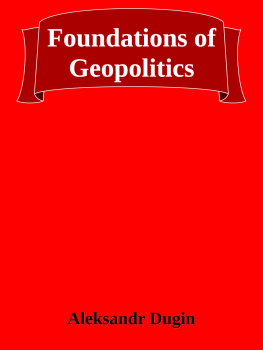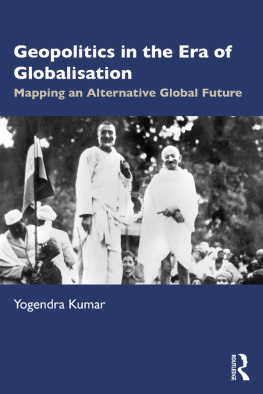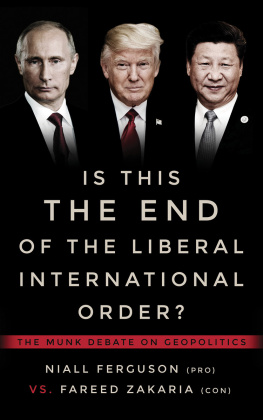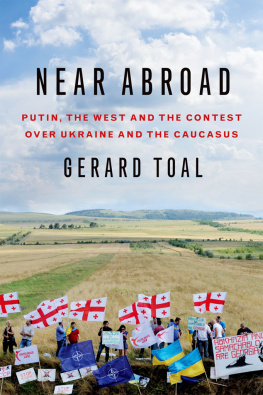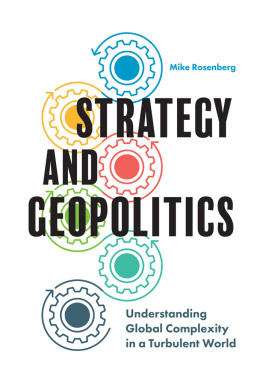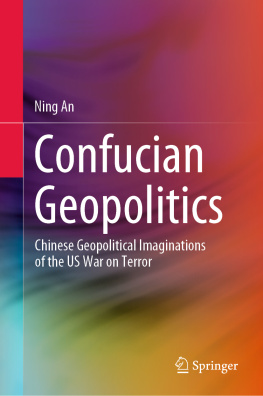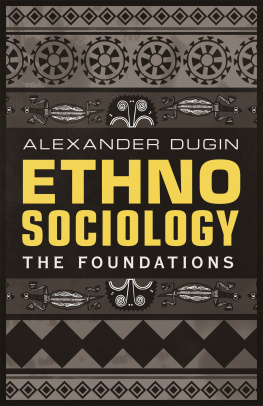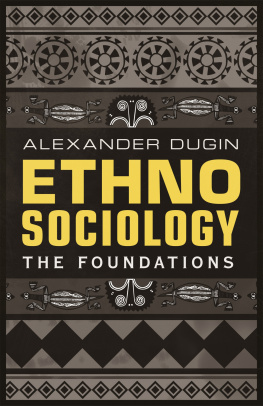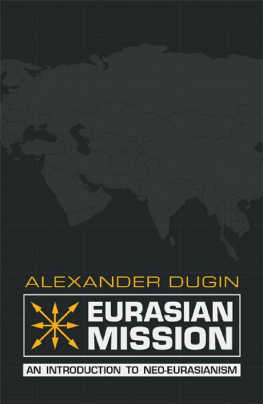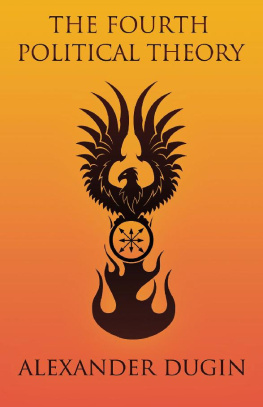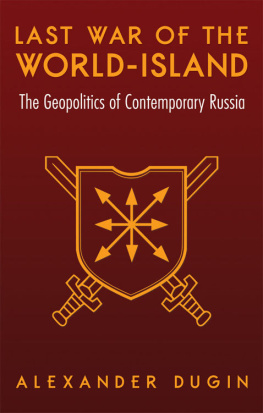Aleksandr Dugin - Foundations of Geopolitics : The Geopolitical Future of Russia
Here you can read online Aleksandr Dugin - Foundations of Geopolitics : The Geopolitical Future of Russia full text of the book (entire story) in english for free. Download pdf and epub, get meaning, cover and reviews about this ebook. year: 1997, genre: Science / Politics. Description of the work, (preface) as well as reviews are available. Best literature library LitArk.com created for fans of good reading and offers a wide selection of genres:
Romance novel
Science fiction
Adventure
Detective
Science
History
Home and family
Prose
Art
Politics
Computer
Non-fiction
Religion
Business
Children
Humor
Choose a favorite category and find really read worthwhile books. Enjoy immersion in the world of imagination, feel the emotions of the characters or learn something new for yourself, make an fascinating discovery.
- Book:Foundations of Geopolitics : The Geopolitical Future of Russia
- Author:
- Genre:
- Year:1997
- Rating:4 / 5
- Favourites:Add to favourites
- Your mark:
- 80
- 1
- 2
- 3
- 4
- 5
Foundations of Geopolitics : The Geopolitical Future of Russia: summary, description and annotation
We offer to read an annotation, description, summary or preface (depends on what the author of the book "Foundations of Geopolitics : The Geopolitical Future of Russia" wrote himself). If you haven't found the necessary information about the book — write in the comments, we will try to find it.
Foundations of Geopolitics : The Geopolitical Future of Russia — read online for free the complete book (whole text) full work
Below is the text of the book, divided by pages. System saving the place of the last page read, allows you to conveniently read the book "Foundations of Geopolitics : The Geopolitical Future of Russia" online for free, without having to search again every time where you left off. Put a bookmark, and you can go to the page where you finished reading at any time.
Font size:
Interval:
Bookmark:
1997
Translated from Russian by Google Translate.
"Original" from https://www.e-reading.mobi/book.php?book=20827
No endnotes included. Some text obviously missing.
Is this book actually complete? Unknown.
Minor corrections by JazzBroadside
Pirate epub edition October 2019
Friedrich Ratzel (1844-1904) can be considered the "father" of geopolitics, although he himself did not use this term in his writings. He wrote about "political geography." His main work, which saw the light of day in 1897, is called the Politische Geographie .
Ratzel graduated from the Polytechnic University in Karlsruhe, where he attended courses in geology, paleontology and zoology. He completed his education in Heidelberg, where he became a student of Professor Ernst Haeckel (who was the first to use the term "ecology"). Ratzel's worldview was based on evolutionism and Darwinism and was colored by a pronounced interest in biology.
Ratzel takes part in the war of 1870, where he recovers as a volunteer and receives the Iron Cross for courage. In politics, he gradually becomes a convinced nationalist, and in 1890 joined the Pan-Germanist League by Karl Peters. He travels a lot in Europe and America and adds ethnology studies to his scientific interests. He becomes a teacher of geography at the Technical Institute of Munich, and in 1886 transferred to a similar department in Leipzig.
In 1876, Ratzel defended his dissertation on Emigration in China, and in 1882, his fundamental work Antropogeography ( Antropogeographie ) was published in Stuttgart, in which he formulated his main ideas: the relationship of peoples' evolution and demography with geographical data, the impact terrain on the cultural and political formation of peoples, etc.
But his most basic book was Political Geography .
In this work, Ratzel shows that the soil is the fundamental, unchanging reality around which the interests of peoples revolve. The movement of history is predetermined by soil and territory. What follows is an evolutionist conclusion that the state is a living organism, but an organism rooted in the soil. The state consists of a territorial relief and scale and of their understanding by the people. Thus, the State reflects an objective geographical reality and a subjective national understanding of this reality, expressed in politics. Ratzel considers the Normal State to be the one that most organically combines the geographical, demographic, and ethnocultural parameters of a nation.
He writes:
At all stages of their development, states are considered as organisms that necessarily remain in contact with their soil and therefore must be studied from a geographical point of view. As ethnography and history show, states develop on a spatial basis, more and more mating and merging with it extracting more and more energy from it, thus, states turn out to be spatial phenomena controlled and animated by this space, and geography should describe, compare, measure them. States countries fit into a series expansion phenomena of life, being the highest point of these phenomena." ( Political Geography (1)).
From this "organist" approach, it is clear that the spatial expansion of the state is understood by Ratzel as a natural living process, similar to the growth of living organisms.
Ratzel's organic approach is also apparent in relation to space itself (Raum). This space is moving from a quantitative material category to a new quality, becoming a living sphere, a living space (Lebensraum), a kind of geobiological environment. From here two other important terms of Ratzel spatial meaning (Raumsinn) and vital energy (Lebensenergie) follow. These terms are close to each other and denote some special quality inherent in geographical systems and predetermining their political design in the history of peoples and states.
All these theses are fundamental principles of geopolitics, in the form in which it will develop somewhat later among the followers of Ratzel. Moreover, the attitude to the state as a living spatial organism rooted in the soil is the main idea and axis of the geopolitical technique. This approach is focused on a synthetic study of the whole complex of phenomena, regardless of whether they belong to the human or non-human sphere. Space as a concrete expression of nature, the environment, is considered as a continuous vital body of an ethnic group, it is the space inhabiting. The structure of the material itself dictates the proportions of the final work of art.
In this sense, Ratzel is the direct heir to the whole school of German organic sociology, of which Ferdinand Tennis was the most prominent representative.
How Ratzel saw the correlation of ethnos and space can be seen from the following fragment of Political Geography :
The state is formed as an organism attached to a certain part of the earths surface, and its characteristics develop from the characteristics of the people and the soil. The most important characteristics are size, location and boundaries. The types of soil along with vegetation, irrigation and, finally, the relationships with the rest follow conglomerates of the earths surface, and first of all, with adjacent seas and uninhabited lands, which, at first glance, are not of particular political interest. the verist make up the country (das Land), but when they talk about our country, all that a person has created and all the memories connected with the earth are added to this. So, from the very beginning a purely geographical concept turns into a spiritual and emotional connection between the inhabitants of the country and their stories.
The state is an organism, not only because it articulates the life of the people on motionless soil, but because this connection is mutually reinforcing, becoming something single, inconceivable without one of the two components. Uninhabited spaces, unable to feed the State, is a historical field under steam. The inhabited space, on the contrary, contributes to the development of the state, especially if this space is surrounded by natural borders. If the people feel naturally on their territory, they will constantly reproduce the same characteristics that, coming from the soil, will be inscribed in it. "(2)
The attitude to the state as a living organism implied a rejection of the concept of inviolability of borders. The state is born, grows, dies, like a living being. Therefore, its spatial expansion and contraction are natural processes associated with its internal life cycle. Ratzel in his book On the laws of spatial growth of States (1901) identified seven laws of expansion:
- The extent of States increases with the development of their culture;
- The spatial growth of the State is accompanied by other manifestations of its development: in the areas of ideology, production, commercial activity, powerful "attractive radiation", proselytism.
- The state expands, absorbing and absorbing political units of lesser importance.
- A border is an organ located on the periphery of a State (understood as an organism).
- Carrying out its spatial expansion, the State seeks to cover the most important regions for its development: coasts, river basins, valleys and generally all rich territories.
- The initial impulse of expansion comes from outside, since the State is provoked by the expansion of the state (or territory) with a clearly lower civilization.
Font size:
Interval:
Bookmark:
Similar books «Foundations of Geopolitics : The Geopolitical Future of Russia»
Look at similar books to Foundations of Geopolitics : The Geopolitical Future of Russia. We have selected literature similar in name and meaning in the hope of providing readers with more options to find new, interesting, not yet read works.
Discussion, reviews of the book Foundations of Geopolitics : The Geopolitical Future of Russia and just readers' own opinions. Leave your comments, write what you think about the work, its meaning or the main characters. Specify what exactly you liked and what you didn't like, and why you think so.

